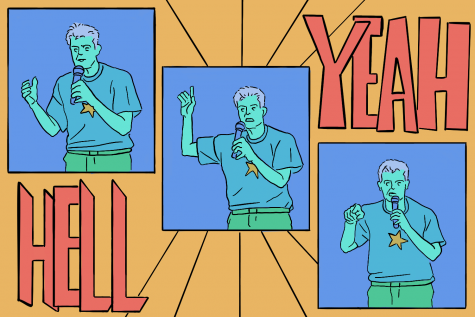Upon retirement, Mark Kelly says Columbia prepared him for role as city’s cultural affairs commissioner
November 22, 2021

Students stood shoulder-to-shoulder under a large white canopy tent and beyond, cooling themselves with white paper fans at Columbia’s 2015 Convocation. A tall, slender man with white hair took the stage and captured their attention.
Mark Kelly, former vice president for Student Success at Columbia, called for students to build coalitions during the “Hell Yeah Liturgy.”
“You’re here to become part of community. No fraternities, no sororities, no intercollegiate athletics, but something more precious in its place — you’re here to build your crew,” Kelly said. “Students! Will you form your creative crews?”
Kelly went on to call for eight more student commitments. After each call, students yelled their “hell yeah!” affirmation in unison.
Kelly left Columbia after 32 years in 2016, finishing his Columbia career as the vice president of Student Success, to work as commissioner of the Department of Cultural Affairs and Special Events for the city of Chicago until he retired Oct. 29.
He said his time at Columbia flowed directly into his role as the head of a large city department with increased responsibilities.
“Any success I had there came from what I learned at Columbia and what I experienced. I took that with me,” Kelly said. “It was absolutely fundamental to my work as the commissioner. In many ways, it was simply an extension of what I thought and tried to do at Columbia. I loved working with the students and treasured my relationships with the Student Affairs staff I had the honor of working with.”
Jim DeRogatis, associate professor of instruction in the English and Creative Writing Department, said Kelly, who held many positions related to students over the years, was beloved by students because his passion for Columbia was contagious.
“I think Mark had a vision that one of the strengths of Columbia is community-building across the arts,” DeRogatis said. “It takes a creative team to do anything of worth, and we’re not just going to stay in silos. We’re going to operate across the college.”
Part of Kelly’s vision also involved moving Columbia’s student body into the workforce across the U.S. with its alumni network already in place.
“I think he always had a big-picture vision for what Columbia is and can be, and that’s inspiring,” DeRogatis said.
Kelly said the core of his identity has always been focused on uniting people to produce their best work.
Kelly is a founding member and former co-chair of the Wabash Arts Corridor, a community-led initiative which began in 2013 that includes students, professional artists, other colleges, cultural institutions and local business establishments. The initiative repurposes urban spaces along Wabash Avenue, the heart of Columbia’s campus, by implementing visual art, music and performances for community engagement.
Even after Kelly’s tenure at Columbia ended, his influence on former studentwas is still evident.
“I’m constantly running into Columbia alums, and most often the way the connection is made is they walk by me, and they yell out ‘hell yeah!’” Kelly said. “It’s great to see students and alumni out there peppered throughout the arts industries.”
Shanita Baraka Akintonde is a 1993 Columbia alum and associate professor of instruction in the Communication Department. She considers Kelly to be a mentor, collaborator and colleague.
“I credit him with a lot of who Shanita Baraka Akintonde is today, not only as a professor at Columbia College Chicago, but who I am as a Black woman, a scholar and a contributor to the world,” Akintonde said.
Akintonde said she and Kelly are “kindred spirits” because of their “deep and sincere” devotion to their work that they use to connect with students and help them progress.
“Mark was able to pull out of students, faculty and staff that je ne sais quoi needed for [them] to really to be able to propel missions forward, and that is what I think he brought to Columbia,” Akintonde said. “I think his legacy in that capacity is still present on campus.”







